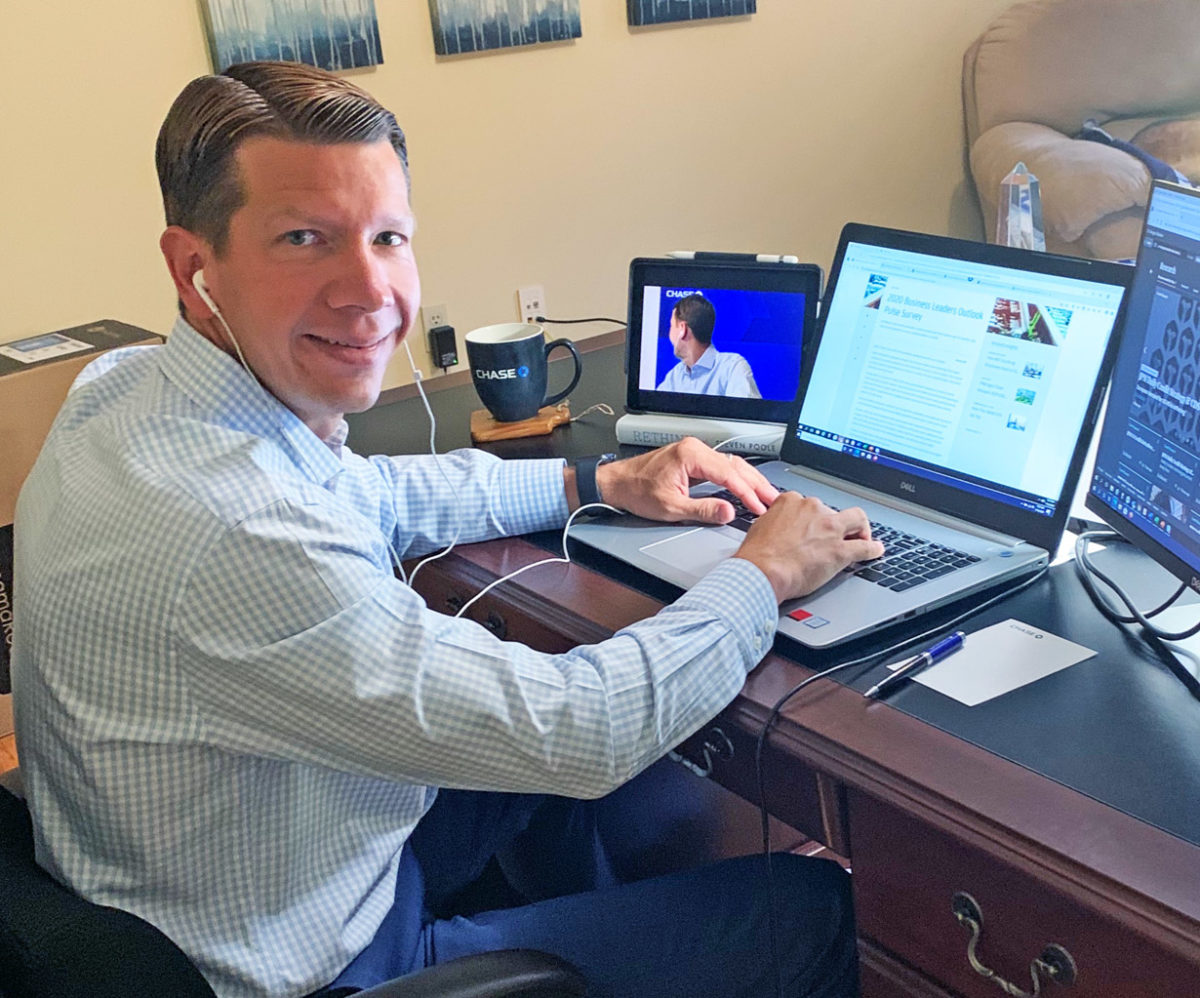A nationwide business survey by JPMorgan Chase finds pockets of optimism despite the economic disruptions resulting from the coronavirus outbreak. At the same time, Brian Huff, an executive at JPMorgan Chase Commercial Banking, found optimism spreading into the Westchester and Mid-Hudson Valley business community.
The survey was directed at middle-market companies with annual revenues between $20 million and $100 million. There were 524 participants in the “Business Leaders Outlook Pulse Survey.”
While 83% said that their businesses are running at reduced capacity, 68% expressed confidence that their businesses will thrive and only 2% were concerned that their businesses may go under. More than half, 53%, expected their companies to return to normal in the next 12 months.

When it comes to economic conditions in the next six months, 33% expressed optimism about their local economy, 35% were optimistic about the national economy and 17% had confidence that all would be well with the global economy.
The economic conditions were identified as the leading challenge facing their business operations by 70% of the respondents. When it comes to revenues and sales in the next six months, 47% said they expected increases. Concern about growing sales was on the minds of 59% of the business leaders. When asked about consumers changing their habits as a result of the pandemic, such as spending more conservatively and doing more buying online, 33% of the respondents said it was a concern.
“We surveyed clients and prospects in an effort to get a deeper understanding of how Covid-19 affected their operations and business performance as well as an outlook on the economy,” Huff, market executive for the commercial bank at JPMorgan Chase told the Business Journal. “The survey questioned a variety of topics but mostly we were looking at how companies pivoted, adapted, and the challenges that they faced in 2020 given the onset of Covid-19.”
Huff said the statistics that showed up in the national survey parallel a lot of what he”™s been hearing from the bank”™s clients locally and seeing in ongoing business operations.
“We do see people making plans, updating their operating models. We have some clients saying ”˜Some jobs are never going to be coming back to the office. Some jobs are going to be part time, they could work from home or come in,”™” Huff said. “Despite the uncertainties, Westchester businesses are being smart, conserving capital.”
In Westchester County, JPMorgan Chase has approximately 75,600 business customers on its roster of about 534,900 customers. It has 74 branches and 937 employees in the county.
“Here in Westchester some of our food and beverage distributors are doing very well,” Huff said. “One company in the food industry space, pre-Covid, mainly sold to restaurants and hotels. They had no direct-to-consumer offerings.”
Huff said that the company was able to create a new website, change its warehouse and then increase staff to begin selling to consumers.
“It”™s really remarkable how clients are changing their businesses going forward,” Huff said. He described two Mid-Hudson companies that were able to pivot and produce Covid-related products.
“One was in the cosmetics industry and they, for the first time ever, began to produce hand sanitizer as a product line. This enabled them to be an essential company and they were able to open their plant during the early stages of Covid. Another company was in the plastics industry where they made plastic water bottles, various other packing materials on the plastic side and they are now producing face shields, part of the personal protective equipment,” Huff said.
Companies that had the ability to adjust in the early stages of the outbreak have been helped with cash flows from new revenue streams that will represent permanent changes to their operating models, he said.
“This pandemic is unlike anything anyone has ever experienced. With continued uncertainly in the economic conditions and a potential second wave we are constantly in communication with our clients,” Huff said.
Sometimes that communication goes well beyond just discussing the economy and other financial subjects. Huff said that the bank is aware that increased fraud against businesses has been a side effect of the pandemic.
“We have seen fraud running rampant so it is something we reiterate constantly with our clients and prospects that they have to be on top of fraud,” Huff said. “We”™re talking about business email compromise, wire fraud, ACH (automated clearing house) fraud, check fraud. We”™re seeing this.”
He said that JPMorgan Chase is warning that anytime a client gets a request to change a bank, change an account or change a method of payment to double- and triple-check.
“We will continue to do everything to keep our Westchester companies afloat,” Huff said. “We have our treasury consulting team that has helped create tools to help companies regarding cash forecasting, liquidity management and controls.” He said that it”™s important for businesses to speak with their banks and keep them up-to-date on business changes and needs.
“We need to understand the challenges that they”™re facing and how we can address it,” Huff said. “I think this pandemic has shown us that those who have the ability to adapt and change will be the most successful. Consumer habits are changing and as a business leader it”™s important for them to figure out how their business is now going to serve their customers given the change in working environment, the change in consumer habits. We stress communication is very important both internally at your company, externally to the bank and to your customers as well.”
Huff said that every company, regardless of size, needs to look at financial forecasting, just as did the business leaders who responded to the JPMorgan Chase survey.
“Every company should look at what is their 13-week cash flow,” Huff said. “What do you think your outflows are going to be? What do you think your inflows are going to be? How can you manage for the next 13 weeks? The next 26 weeks? The next 52 weeks? If they get that granular on the cash flow side, and we can help them to do that, that helps them foresee and show what they think their business is going to do going forward.”




















